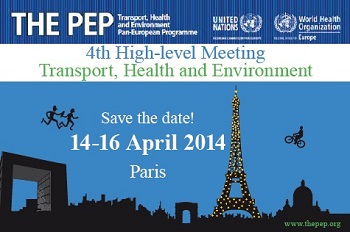
The ECF at the UN’s Transport, Health and Environment Think Tank for Europe
“We are here because cycling is part of the solution for all 3 areas THE PEP covers”. So began the ECF’s statement at the 11th THE PEP Steering Committee Session held in Geneva this past November.
THE PEP is an acronym for Transport, Health and Environment Pan-European Programme. This is the programme that the UNECE (United Nations Economic Commission for Europe) is delivering in the fields of transport, health and environment policies. Key players from these three sectors come together to find solutions for tomorrow’s issues in five major fields: Sustainable urban Transport, Institutional arrangements for policy integration, Health impacts of transport, Cycling and walking, Green economy.
The “High Level Meeting” is THE PEP’s top body. The next Meeting (the fourth since THE PEP was established in 2002) is scheduled to take place in Paris on 14-16 April 2014.
THE PEP Steering Committee is the principal decision-making body for the implementation of THE PEP. It gives guidance and strategic directions: ECF is part of it, working to influence from the inside the final outcomes of the process, to create the best conditions possible for cyclists.
ECF has every right to sit at the table: it supports the facts and opinions contained in the concept note prepared by THE PEP secretariat. Among its focuses, the promotion of policies and actions conducive to healthy and safe modes of transport: a core activity for ECF. Here’s how ECF has been working towards this goal:
DOUBLE CYCLING
Focus on doubling cycling from 35 million or 7.4% mode share (from Eurobarometer 2010) to 15% by 2020 – thus seeing that 70 million people are cycling regularly for transportation.
ROAD SAFETY
In 2011 the ECF successfully lobbied the EU Parliament to adopt a resolution in which it “strongly recommends the responsible authorities to introduce speed limits of 30kph in all residential areas and on single-lane roads in urban areas which have no separate cycle lanes.” ECF supported the Citizens’ Initiative promoting 30 kph and promoted it conceptually with arguments and articles.
PUBLICATIONS/1
In 2011 ECF published its CO2 study – showing the benefits of cycling versus other motor vehicles regarding air quality – and had press releases in 5 other EU languages as well.
PUBLICATIONS/2
In 2013 ECF produced a report on the Economic benefits of cycling in the EU-27. ECF estimates the number to be well above € 200 bn annually, or more than € 400 for every person that lives in the EU. By far the biggest single chunk is on the health side, with over € 110 bn annually. ECF calculated this figure by using the Health Economic Assessment Tool (HEAT) for Cycling, developed by the World Health Organization (WHO).
PUBLICATIONS/3
ECF lobbied hard and got the European Parliament Plenary Session to Pass Key EuroVelo Legislation in November 2013.
PLATFORMS
ECF participates actively in HEPA Europe, and the DG SANCO Platform for Diet & Physical Activity.
National representatives and stakeholders are working on a joint document to present at the Paris meeting with the aim to have it adopted as Draft Outcome Document (“Paris Declaration”).
Not only is the ECF enabling cyclists’ voices to be heard – it’s also bringing in other stakeholders from the bicycle world.
Asked to introduce the cycle industry to the Committee, ECF has brought on board Colibi (the European association of bike manufacturers) represented by Moreno Fioravanti.
“Colibi’s help will be crucial in supporting our campaigns for sustainable mobility”, notes ECF Director of Development Kevin Mayne. “With the fresh, differentiated point of view that comes from the inclusion of the bike manufacturers, we will have more to bring to the discussion in preparation of the Paris meeting".
- Log in to post comments
Contact the author
Recent news!
Upcoming events
Contact Us
Avenue des Arts, 7-8
Postal address: Rue de la Charité, 22
1210 Brussels, Belgium











